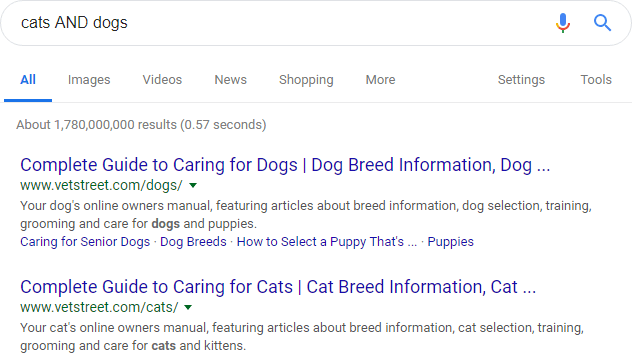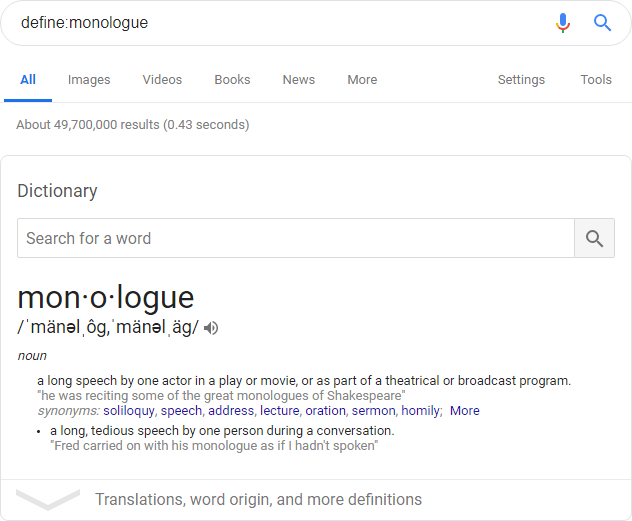A search operator is a special character or special string of characters that you can include somewhere in your query to give the search engine more information on exactly what to do with your search term(s). Though Google has yet to explain why, they’ve been sneakily getting rid of some of their search operators over the last decade. The + (plus) operator is just one example, which disappeared in 2011. Google also doesn’t keep an official list of all of the search operators that Google Search accepts at any given time. This has led to search operators becoming a bit of a secret and lost art. The good news is that we’ve got a list of 21 operators that still work today, and we’re going to show you exactly how to use them.
Basic Google Search Operators
Google Search allows you to utilize many single-character or symbol-based operators that perform some of their most basic and useful search filtering. For basic search purposes, you’ll find yourself using these more than any other operators.
“search term”
Google has been increasingly allowing synonyms to match your search terms. Using quotation marks around your query, or part of your query, will force an exact match.
* (asterisk)
The asterisk search operator allows for wildcard searching. Use it as a substitute for any term or phrase, before, after, or in between.
Example: online * tips
– (hyphen)
The hyphen search operator will exclude any term or phrase directly after it.
Example: basketball -NBA
() (parentheses)
Putting a search term in between parentheses will group it away from the rest of your query, allowing for a more refined and specific search. Use it similar to how you would a mathematical function.
Example: (basketball AND football) athletes
Conditional Google Search
Operators
The two conditional Google Search operators allow you to make searches based on the logical “and” and “or” statement connectors. Anyone with a little bit of coding experience should find these to be very familiar.
AND
Using this operator will show results that are related to both terms. Google effectively defaults to searching this way, though, so you only feel the impact of this operator when you use it along with others.
OR
This operator will show results related to both terms or each term individually.
Example: sports OR games
Technical Google Search Operators
Some of the best Google Search operators are ones that require a deeper understanding of how domains and websites work. Using these will allow you to dig up content and search methods that the majority of Google users will never find.
site:
This operator will limit search results to only sites that are indexed from a specific domain or URL. This is great for when you’re researching a site to see what its presence on Google is like.
cache:
This operator unlocks a Google feature similar to what is offered by the Internet Archive. Rather than taking you to a search results page, after typing any URL after this operator, Google takes you to its latest cached version of the website. For popular websites, the cached version can be as early as a few minutes ago. For others, it may be several days.
Example: cache:thebackroomtech.com
related:
Although Google hasn’t made it clear exactly how this operator makes its determinations, this search operator will show you other websites related to a domain or URL. It’s a very interesting way to find alternatives to sites that you already love.
Example: related:online-tech-tips.com
filetype:
Used alone, this search operator doesn’t achieve much. However, when you pair it with other search terms or operators, searching for content by a specific file extension can be extremely valuable. This operator only works with file types that contain text, but you can search Google Images for file types like GIF, PNG, and more.
Example: readme filetype:txt
inurl:
This operator will allow you to search for results based on text found in the website’s URL.
Example: inurl:pizza
allinurl:
This operator will allow you to search for results based on if all of the terms following it are found in the website’s URL.
Example: allinurl:pizza crust
intitle:
This operator will allow you to search for results based on text found in the website’s title.
Example: intitle:zoo
allintitle:
This operator will allow you to search for results based on if all of the terms following it are found in the website’s title.
Example: allintitle:zoo animals
intext:
This operator will allow you to search for results based on text found in the website’s content.
Example: intext:films
allintext:
This operator will allow you to search for results based on if all of the terms following it are found in the website’s content.
Example: allintext:comedy films
Instant Google Search Operators
If you’ve been on the Internet for a while, you may remember the time when Google had an “I’m Feeling Lucky” button that would instantly take you straight to the first result of your search query. Well, Google Search has a few operators that are something like that. These will allow you to get immediate, specific results.
define:
This operator allows you to get an instant definition preview of any word.
weather:
This operator allows you to get the weather based on any location—by postal/ZIP code, city name, state, or country. The broader locations will match to the most popular location in that region.
Example: weather:atlanta
stocks:
This operator shows a stock’s share price, its recent trend, and a price graph. Information like the closing price, daily high and low, market cap, and more are also displayed.
Example: stocks:aapl
map:
This operator will return a result from Google Maps related to any geographic location. You can use any location descriptor: name, postal/ZIP code, coordinates, etc. There are also ways that you can view your Google Maps search history and Google Maps location history.
Example: map:florida
movie:
This operator is a great way to research all of the information you could ever want to know about any movie. The results will be displayed beside an instant preview card that shows its ratings from credible sites, description, release date, cast, and more.
Example: movie:dumb and dumber
That’s it! These are the 21 Google Search operators that you’ll find most useful. There are many more floating around, and who knows when Google will pull the plug on them, but these operators are known to work consistently. Many other operators that you won’t find listed here don’t work as intended the majority of the time. Once you’ve mastered Google Search operators, finding exactly what you need becomes so much easier. Memorize these and you’ll never have to worry about being lost on the Internet again!




